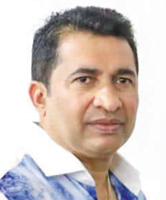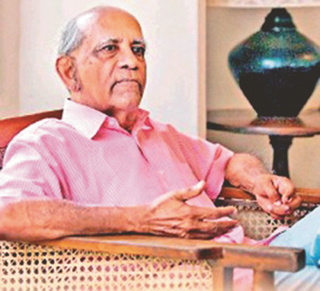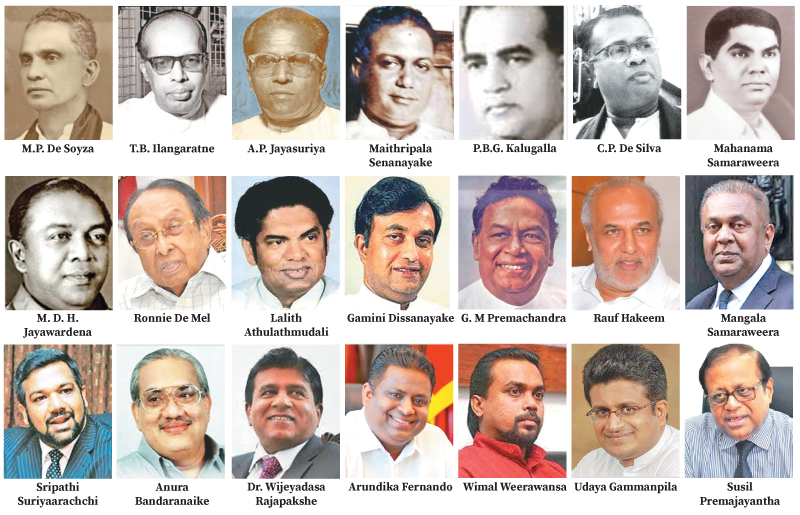Roshan Ranasinghe, who was the Minister of Sports, exercised the powers he claimed to be entitled to and established an Interim Committee for Cricket without the President’s knowledge, and his actions have come under criticism recently. Former Minister Ranasinghe criticised the President and the Government on several occasions and used the opportunity of the 2024 Budget Debate to criticise the Government’s action with regard to cricket. According to the executive powers of the President, on November 27, Ranasinghe was removed from the posts he held as Minister of Sports, Youth Affairs and Irrigation. The President then appointed Harin Fernando as the Sports and Youth Affairs Minister and the Irrigation Ministry went to Pavithra Vanniarachchi.
1959 Vijayananda Dahanayake’s period as Prime Minister
When examining the political history of Sri Lanka, it is common to find instances where past Presidents and Prime Ministers used their powers to dismiss Ministers for certain reasons.
It started in 1959 when Vijayananda Dahanayake was the Prime Minister. After the death of Prime Minister S.W.R.D. Bandaranaike on September 26, 1959, Vijayananda Dahanayake became the fifth Prime Minister of Sri Lanka. Dahanayake was only in office for three months. Power struggles continued to rage in the Government during Dahanayake’s tenure.

Former Minister of Sports, Youth Affairs and Irrigation Roshan Ranasinghe
Many people started to accuse Dahanayake that his policies are not aligned with those of the Sri Lankan Freedom Party.
In the midst of all this, Dahanayake was trying to maintain stability. One of the main objectives of his consolidation of power was the dismissal of Sri Lanka Freedom Party ministers who were not friendly to him.
On November 8, 1959, Labour Minister M.P. De Soyza was fired, and at midnight on December 8, Home Minister T.B. Ilangaratne, Health Minister A.P. Jayasuriya, Transport and Power Minister Maithripala Senanayake and Culture Minister P.B.G. Kalugalla were expelled from the Cabinet. Minister of Lands and Agriculture C.P. De Silva resigned on December 12, 1959 before his dismissal.
Acting Minister of Local Government and Housing, M.B.W Madiwaka, Food and Trade Minister R. G. Senanayake, Industry and Fisheries Minister J.C.W. Ministers Munasinghe and Government Works Minister Henry Abeywickrama were sacked at midnight on January 6, 1959.
Apart from this, the Minister of Local Government and Housing was removed on 20 October 1959 for other reasons and the Minister of Finance, Stanley de Soyza, resigned on 23 November.
Sirimavo Bandaranaike era
Sirimavo Bandaranaike, the wife of former Premier S.W.R.D. Bandaranaike, became the leader of the Sri Lanka Freedom Party after the latter’s assassination. But by this time, C.P. De Silva, who was an experienced senior politician, had met the proper qualifications for the leadership of the party. But because he belonged to the Salagama caste, he lost the party leadership.
A General Election was held in March 1960. Dudley Senanayake took the United National Party (UNP) to victory.
However, the life of the new Government was limited to a few hours due to the failure of the Throne Speech delivered by the new Prime Minister during the first Parliamentary Session held after that victory. Then in July 1960, a General Election was held again and Sirimavo became Prime Minister.
Next, the resistance against the Government arose from within the Government itself. C. P. De Silva was frustrated because he was not given the leadership he deserved. Both he and Mahanama Samaraweera were in the party but supported the UNP to bring an anti-SLFP campaign. In the end, both of them were sacked.
J. R. Jayewardene era
J.R. Jayewardene’s Presidential era commenced in 1978. After certain developments with regard to the ethnic issue, politicians like Cyril Mathew, who had radical attitudes, were forced to leave the Government.

Former General Secretary of
Parliament Nihal Seneviratne
In 1977, during the JRJ Government’s first Budget debate, M. D. H. Jayawardena started criticising the budget deficit and was fired from his ministerial portfolio.
Minister Gamani Jayasuriya resigned instead of being dismissed. He protested against the Indo-Lanka Accord signed on July 27, 1987 and resigned from the post of Minister before his imminent dismissal. Ronnie De Mel, who was Finance Minister for a long time, was dismissed from his position because he criticized his last Budget.
Ranasinghe Premadasa era
Former Ministers of the President Ranasinghe Premadasa era, Lalith Athulathmudali, Gamini Dissanayake and G. M Premachandra were impeached by the UNP’s Exco during 1992-93. After that, they went to the Supreme Court. However, the Court ruled that their removal was valid.
Chandrika Bandaranaike Kumaratunga era
After June 20, 2001, the era of former President Chandrika Kumaratunga commenced. Muslim Congress leader Rauf Hakeem, who was the Ports Minister of the Government at that time, was dismissed from his post because he issued statements criticising the Government.
Mahinda Rajapaksa era
In February 2007, President Mahinda Rajapaksa removed Mangala Samaraweera, Minister of Ports and Aviation, Anura Bandaranaike, Minister of National Heritage, and Sripathi Suriyaarachchi, Deputy Minister of Ports Development, from Cabinet due to their actions and statements against the Budget proposals.
Maithripala Sirisena era
Sackings also took place during the Good Governance Government of President Maithripala Sirisena. In August 2017, Minister Dr. Wijeyadasa Rajapakshe was removed from his post of Minister in charge of Justice and Buddhasasana Affairs under the charge of violating the collective responsibility of the Cabinet by publicly criticising the Government’s policies such as the decision to lease Hambantota Port to China for 99 years, in Parliament and on the media. Arundika Fernando, a former Minister during the Sirisena presidency, was also dismissed.
Gotabaya Rajapaksa era
During the tenure of President Gotabhaya, a ten-year resolution for the entire country was unveiled at the Monarch Imperial Hall in Jayawardenepura Kotte in March 2022 with the participation of 11 minor parties representing the Government.
After this event where 11 minor parties came together, two former Ministers, National Freedom Front leader Wimal Weerawansa and Pivithuru Hela Urumaya leader Udaya Gammanpila, had to resign from their ministerial posts that same evening.
This was due to their controversial statements criticising the Government’s programs in the “Mulu Ratama Hari Magata” meeting. After those dismissals, a Cabinet reshuffle took place on the evening of that same day, with several Ministers changing their ministerial positions.
Minister Gammanpila’s Minister of Energy position was given to Gamini Lokuge, who was the Minister of Electricity. Minister Pavithra Vanniarachchi, who was the Minister of Transport, was sworn in as the Minister of Electricity. Dilum Amunugama, who was the Minister of State, was supposed to hold the position of Minister of Transport which was held by Vanniarachchi. S.B. Dissanayake was sworn in as the Minister of Industries which was earlier held by Weerawansa.
Former Minister of State Susil Premajayantha was the closest to being sacked for making a controversial statement about the functioning of the Government. Premajayantha, who was the Minister of State for Education Reforms, Open Universities and Distance Education, was removed from the position on January 4, 2022 by President Rajapaksa.
That was after a statement he made criticising the Government at the Delkanda market the day before when journalists questioned him about the rising prices of goods and the shortage of essential goods. He blamed the rising prices on appointing unqualified people to positions. He severely criticized the Government’s agricultural policy and said that agriculture has failed completely. He also stated that another group can find solutions to the situation.
The same fate befell Minister Roshan Ranasinghe recently. Matters like criticising Government and neglecting collective responsibilities of the Government have also been the case here.
According to the 1978 Constitution, a President can remove a minister or appoint a new Minister at any time without any question (as long as he is an MP), according to the Executive Powers vested in him.
“All this is done in accordance with the Constitution. Even in the past, countless such incidents have happened. When Government Ministers criticised policy, neglected collective responsibility and acted against the State, the President exercised his or her Executive Powers and removed such Ministers from their positions,” says Nihal Seneviratne, a former General Secretary of Parliament.









